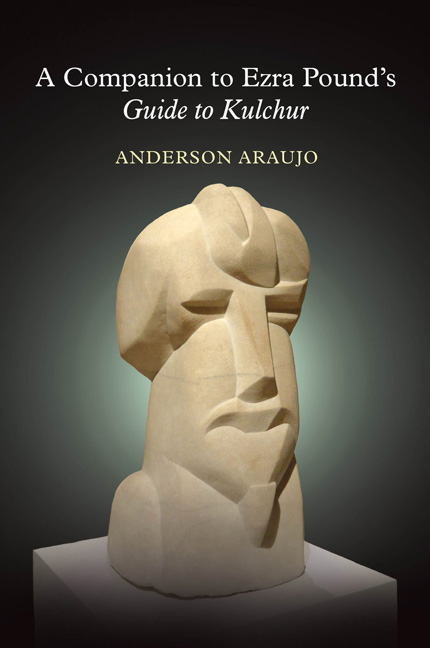Book contents
- Frontmatter
- Contents
- Acknowledgments
- Abbreviations
- Introduction
- Guide to Kulchur
- Part I
- Section I
- Section II
- Part II
- Section III
- Section IV
- Part III
- Section V
- Section VI
- Part IV
- Section VII
- Section VIII
- Section IV
- Part V
- Section X
- Section XI
- Part VI
- Section XII
- 53 Study Of Physiognomy
- 54 And Therefore Tending
- 55 Pergamena Deest
- 56 Watch The Beaneries
- Section XIII
- Addenda: 1952
- Notes
- Index
56 - Watch The Beaneries
from Section XII
- Frontmatter
- Contents
- Acknowledgments
- Abbreviations
- Introduction
- Guide to Kulchur
- Part I
- Section I
- Section II
- Part II
- Section III
- Section IV
- Part III
- Section V
- Section VI
- Part IV
- Section VII
- Section VIII
- Section IV
- Part V
- Section X
- Section XI
- Part VI
- Section XII
- 53 Study Of Physiognomy
- 54 And Therefore Tending
- 55 Pergamena Deest
- 56 Watch The Beaneries
- Section XIII
- Addenda: 1952
- Notes
- Index
Summary
Beaneries: American slang for cheap restaurants and one of Pound's favorite putdowns for universities, as shown in his anti-Semitic tirade in Canto 91:
Democracies electing their sewage
till there is no clear thought about holiness
a dung flow from 1913
and, in this, their kikery functioned, Marx, Freud
and the american beaneries
Filth under filth (91/633–34)
make your Gestalt, of Kung … and the peripheries: Cf. Canto 94,
To Kung, to avoid their encirclement,
To the Odes to escape abstract yatter,
to Mencius, Dante, and Agassiz
for Gestalt seed
pity, yes, for the infected, but maintain antisepsis,
let the light pour. (94/655)
a NEW Quattrocento: i.e., a new Renaissance, akin to the Early Renaissance in fifteenth-century Italy.
caught like X. in a forgery: The unexpurgated GK shows “Prof X,” whose identity remains unidentified.
The light of the Sorbonne shone: In April 1231, Pope Gregory IX (c.1145–1241) issued a bull, Parens scientiarum, granting the University of Paris the authority to establish statutes regulating all manner of academic practices in its schools, including the defense of theses.
“University not here for the unusual man … Carl Sandburg: The phrase originally appeared in a letter Pound wrote on February 24, 1925 to art patron and philanthropist Simon Guggenheim (1867–1941). “Prof. S.” refers to Felix E. Schelling (1858–1945), a literature professor and head of the Department of English at the University of Pennsylvania when Pound was a student there (cf. note GK 215–16). In the fall of 1916, Pound had written to Schelling recommending that the poet Carl Sandburg (1878–1967) be offered a fellowship “for creative ability” at the university, a proposal the professor rejected. It was also Schelling who told Pound that he was wasting his time pursuing a doctorate, effectively putting an end to his thesis on the Spanish Golden Age poet-dramatist Lope de Vega (1562–1635) (cf. notes GK 28, 61).
- Type
- Chapter
- Information
- A Companion to Ezra Pound's Guide to KulcherGuide to Kulcher, pp. 354 - 356Publisher: Liverpool University PressPrint publication year: 2018



